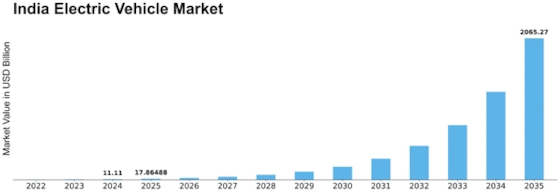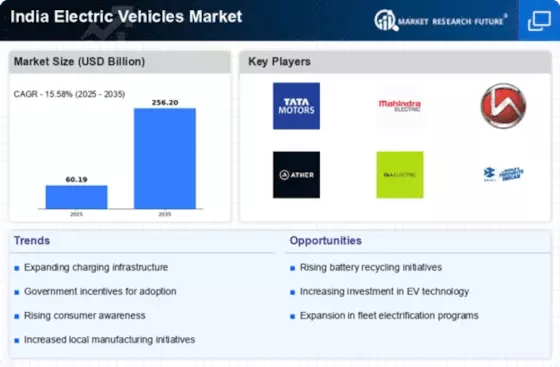India Electric Vehicle Size
India Electric Vehicle Market Growth Projections and Opportunities
The electric vehicle (EV) market in India is witnessing dynamic growth, driven by a combination of factors that reflect the country's commitment to sustainable and green transportation. One significant market factor is the government's push towards electric mobility. In recent years, India has implemented various policies and incentives to promote the adoption of electric vehicles, including tax benefits, subsidies, and initiatives like the Faster Adoption and Manufacturing of Hybrid and Electric Vehicles (FAME) scheme. These measures aim to reduce air pollution, decrease dependence on fossil fuels, and align with India's ambitious goal of achieving 30% electric vehicle penetration by 2030.
The increasing concern over air quality and environmental degradation in major Indian cities is another crucial driver of the electric vehicle market. With urban areas grappling with high levels of pollution, there is a growing awareness among consumers about the need for cleaner and more sustainable modes of transportation. Electric vehicles, with their zero-emission profile, emerge as an attractive alternative, especially for urban commuting. The emphasis on reducing the carbon footprint and mitigating climate change contributes significantly to the rising demand for electric vehicles across the country.
Technological advancements play a pivotal role in shaping the electric vehicle market in India. As global EV technology continues to evolve, Indian manufacturers are actively adopting and adapting these innovations to meet local demands. Improvements in battery technology, charging infrastructure, and vehicle performance are key factors influencing the market. Additionally, the development of affordable and efficient electric two-wheelers and three-wheelers has been a game-changer in India, catering to a vast segment of the population and contributing to the widespread adoption of electric mobility.
Charging infrastructure is a critical aspect influencing the growth of the electric vehicle market in India. The availability of a robust and widespread charging network is essential to address range anxiety and facilitate the seamless integration of electric vehicles into daily life. Both government and private initiatives are working towards expanding the charging infrastructure across cities and highways. The growth of public charging stations, along with innovative solutions such as home and workplace charging, is crucial for the sustained success of the electric vehicle market in India.
The financial landscape is another significant market factor. While the initial cost of electric vehicles remains relatively high compared to traditional vehicles, the total cost of ownership is increasingly becoming competitive. Lower maintenance costs, reduced fuel expenses, and government incentives contribute to making electric vehicles financially viable for consumers. Financial institutions are also offering attractive financing options, further facilitating the transition to electric vehicles.
Consumer awareness and education play a crucial role in the Indian electric vehicle market. While awareness about electric vehicles is on the rise, there is still a need for comprehensive campaigns to inform consumers about the benefits, range capabilities, and overall sustainability of electric vehicles. Addressing misconceptions and promoting the positive aspects of electric mobility can significantly influence consumer choices and contribute to the market's growth.
Geopolitical factors, such as India's dependence on oil imports and the global push towards sustainable practices, also influence the electric vehicle market. The government's focus on reducing the country's reliance on fossil fuels aligns with the broader global movement towards clean energy and sustainable transportation. As India aims to position itself as a leader in the electric vehicle space, geopolitical considerations will continue to shape policies and initiatives supporting the growth of the electric vehicle market.
The electric vehicle market in India is experiencing substantial growth, driven by a combination of government policies, environmental concerns, technological advancements, infrastructure development, financial incentives, consumer awareness, and geopolitical factors. The convergence of these elements creates a favorable environment for the widespread adoption of electric vehicles, transforming the mobility landscape in India.



















Leave a Comment